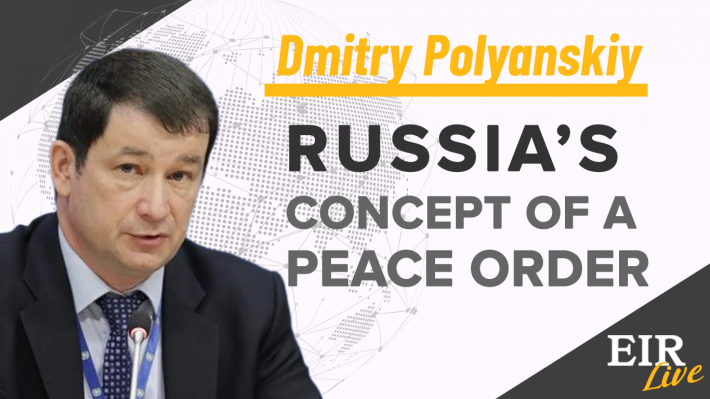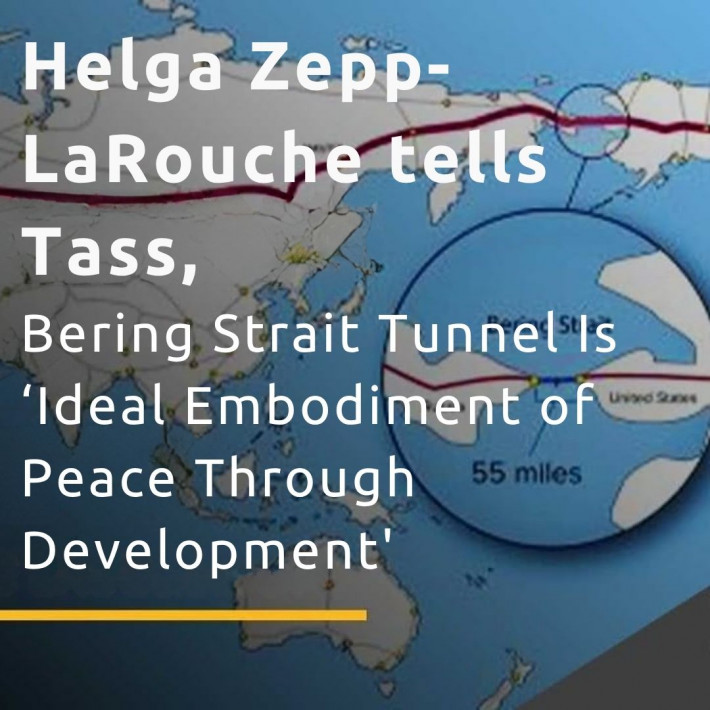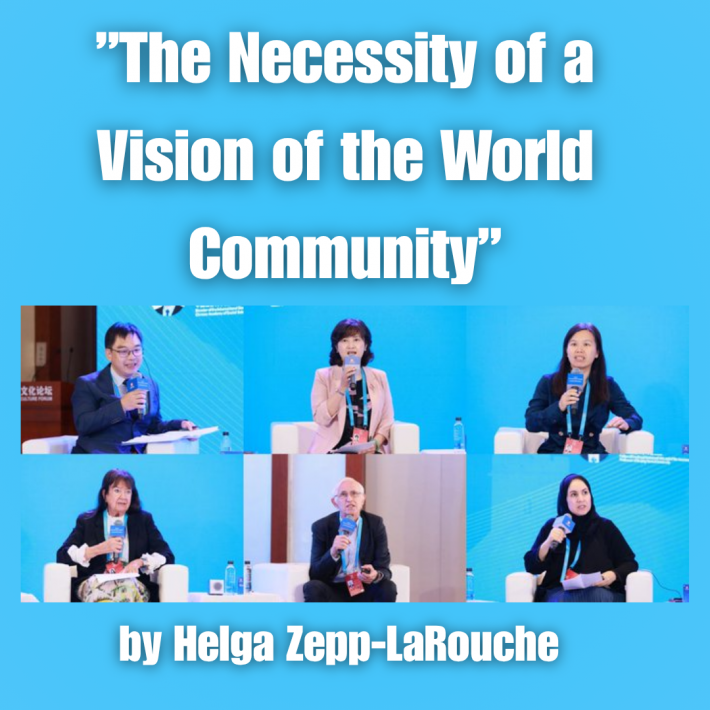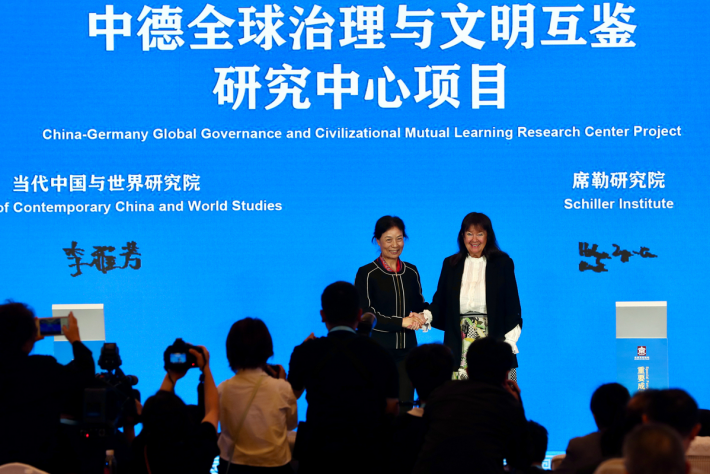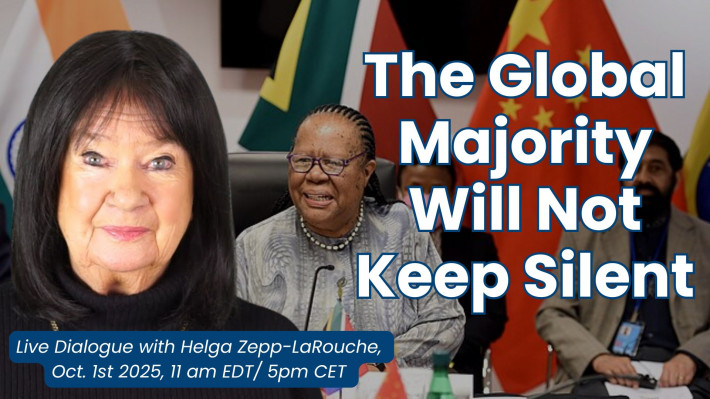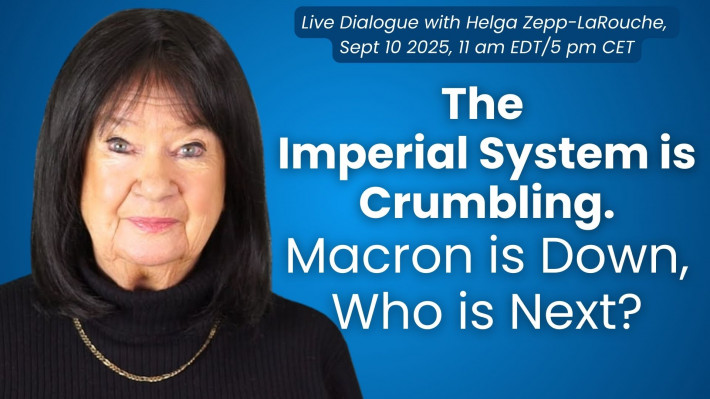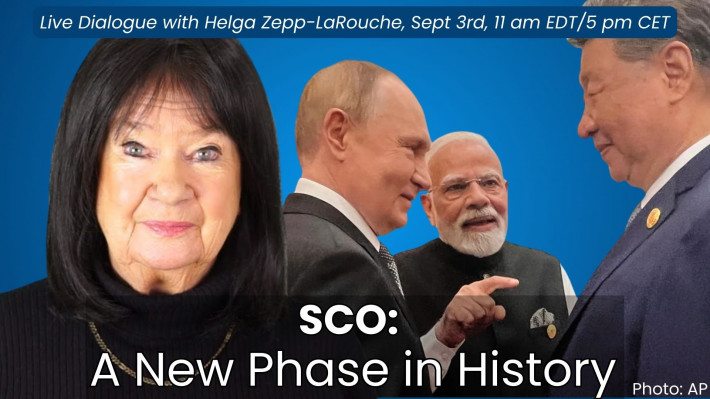Schiller Institute founder Helga Zepp-LaRouche issued an open letter on Nov. 5, calling for representatives of all religions and cultures around the world to start a dialogue to solve the strategic crises facing Mankind, inspired by Nicolaus of Cusa’s “coincidence of opposites” method of thinking, as recently emphasized by Pope Leo XIV in his Oct. 25 Jubilee Audience sermon. Zepp-LaRouche’s letter is followed by a packet of print and video documentary materials, including crucial writings on Cusa by Zepp-LaRouche and her late husband, Lyndon H. LaRouche.
The Two Largest Nuclear Powers: Cooperation, or Confrontation? Join EIR News on our YouTube channel today, November 5, at 10am EST/ 4pm CET for a live interview of the Russian Federation’s First Deputy Permanent Representative at the United Nations, Dmitry Polyanskiy, conducted by Helga Zepp-LaRouche, editor-in-chief of EIR.
Join EIR News on our YouTube channel today, November 5, at 10am EST for a live interview of the Russian Federation’s First Deputy Permanent Representative at the United Nations, Dmitry Polyanskiy, conducted by Helga Zepp-LaRouche, editor-in-chief of EIR.
The danger of nuclear extinction war has not abated, as Dr. Ted Postol of MIT showed in his October 24 comments to the International Peace Coalition. Nevertheless, a new paradigm of peace through development is shining through, as reflected in the circulation of the Bering Strait Tunnel project as a solution to the crisis in US-Russia relations, by Kirill Dmitriev, CEO of the Russian Direct Investment Fund. A representative of the RDIF participated in the October 22 EIR international roundtable discussion on the strategic implications of the Bering Strait Tunnel project, during which program Zepp-LaRouche shared her view:
“[T]he realization of the Bering Strait Tunnel is potentially and very likely the answer as to if we have war or peace. Because, if we get to an agreement between the two largest nuclear powers in the world, to replace confrontation with cooperation which is to the benefit not only of those two countries, but actually of all countries in the world, it can be the game changer which marks the departure from the present extremely dangerous moment in history.”
How does the Russian government view the strategic dynamic? What are the principles of the “polyphonic world order” advocated by Russian President Vladimir Putin? Join the program to learn more.
Subscribe, like, and share!
Join Helga Zepp-LaRouche in her live dialogue and discuss the issues and solutions that move the world and its people. Send your questions, comments, and reports to questions@schillerinstitute.org or post them in the next live stream.
Our present phase of history is a time of terrible tension between those promoting war, and those promoting resolution of disputes. Deliberate backing of armed conflict in an age of nuclear weapons is insane. But there are growing forces of reason and hope.
Pope Leo XIV’s raising, on Oct. 25, the breakthrough concepts of Cardinal Nicholas of Cusa (1401-1464) is an important advance for forces seeking peace. Cusa’s concept of seeking and proceeding on the higher level of overcoming differences has repeatedly been studied, reported, and advocated by Lyndon and Helga LaRouche over decades. But most particularly, Mrs. Zepp-LaRouche formed an activist association in 2020 that she named the Committee for the Coincidence of Opposites, based on Cusa’s idea of the coincidentia oppositorum (coincidence of opposites), which organization came to be the precursor to the International Peace Coalition, founded in June 2022, at the initiation of Zepp-LaRouche, and now functioning as a critical platform for world dialogue.
At the Vatican on Oct. 27, Prime Minister of Hungary Viktor Orban met with Pope Leo. Orban has volunteered for Budapest to be the venue for a meeting between U.S. President Donald Trump and Russian President Vladimir Putin. Orban posted on X today, “I asked His Holiness to support Hungary’s anti-war efforts. Private audience with His Holiness Pope Leo XIV.”
Other figures and associations, likewise acting on the side of humanity, include leaders of the Global Majority, the BRICS, the expanding Shanghai Cooperation Organization, and collaborating initiatives. In the Indo- and Asian-Pacific this week, there are signals of this direction. Speaking of amity, on Oct. 26 India’s Prime Minister Narendra Modi, addressing the ASEAN-India Summit in Malaysia by video, pointed out that India and the ASEAN 11 nation members, now constitute 25% of the world’s population, and intend to continue to function as friends.
On the sidelines of the APEC summit in South Korea this week, President Trump reports he will meet with China’s President Xi Jinping. On Oct. 28, President Trump, now in Tokyo, Japan, is scheduled to meet with Prime Minister Sanae Takaichi, who has expressed concern to pursue a foreign policy of stability and peace in the region. This goes against the prevailing Western insistence that China is the enemy.
The most direct threats of warfare continue to come from the Europe-centered “Coalition of the Willing,” directly charging that Russia is the enemy, bent on invading Europe. Add to this the U.S. belligerence in the Western Hemisphere, building up military forces in the Caribbean.
In the last 10 days, military spokesmen in France have called for contingency readiness that could see French forces placed directly in Ukraine. Chief of Staff of the French Army Gen. Pierre Schill told members of the Defense Committee of the National Assembly on Oct. 24: “We will be ready to deploy forces under security guarantees, if necessary—for the benefit of Ukraine.” He stated that 2026 will be the “year of coalitions,” pointing out that upcoming multinational military exercises, “Orion 26,” will test land, air, and naval contingents, wherever they have to go.
In the Caribbean, U.S. military activity and force deployment have escalated, along with homeland propaganda that fighting the dope trade means taking down Venezuela. The guided missile destroyer USS Gravely has now docked in Port of Spain, Trinidad and Tobago, within seven miles of Venezuela. The story is that the ship is carrying out training exercises until Oct. 30. The aircraft carrier USS Gerald R. Ford has been ordered to the Caribbean, from its present location in the Mediterranean. There have been nine U.S. airstrikes on boats in international waters in the Caribbean, plus two in the Pacific off the western coast of Central America. At least 43 persons were killed.
The International Peace Coalition will convene its 126th consecutive weekly meeting on Friday, Oct. 31, at 11 am (ET).
Join Helga Zepp-LaRouche in her live dialogue and discuss the issues and solutions that move the world and its people. Send your questions, comments, and reports to questions@schillerinstitute.org or post them in the next live stream.
The following is a machine translation of an interview Helga Zepp-LaRouche gave to TASS news service on the now widely discussed proposal for a Bering Strait Tunnel connecting Russia and the United States. The late American statesman and economist Lyndon LaRouche had long advocated the building of the Bering Strait Tunnel great project:
Expert Zepp-LaRouche Assesses the Prospects of a Tunnel between Russia and the United States
It would embody the concept of “peace through development,” says Helga Zepp-LaRouche, founder of the Schiller Institute.
WASHINGTON, October 18. /TASS Correspondent Sergei Yumatov. A tunnel built under the Bering Strait and connecting Russia and the United States would be the ideal embodiment of the concept of “peace through development.” Helga Zepp-LaRouche, founder of the Schiller Institute, outlined this position in an interview with a TASS correspondent.
“It is obvious to President Trump that normalizing U.S.-Russia relations will open up enormous prospects for developing economic cooperation between the two countries. The most impressive [project] would be the ‘Putin-Trump tunnel,’ which, as Kirill Dmitriev, CEO of the Russian Direct Investment Fund, noted on social media, would become a 70-mile link between America and Afro-Eurasia across the Bering Strait,” the expert noted.
According to her, “the tunnel would help open up the entire Russian Far East for development and create enormous investment opportunities for resource-poor countries.” “The Putin-Trump Tunnel would be the ideal embodiment of the ‘peace through development’ concept,” Zepp-LaRouche emphasized. The choice of Budapest as the venue for a new meeting between Russian and American leaders, according to the expert, “will remind Europeans of the nearly lost art of diplomacy.” “This is good for the entire world,” she concluded.
President Donald Trump called the Bering Strait tunnel project, which would connect Russia and the United States by rail, “interesting.” Kirill Dmitriev, the Russian President’s Special Representative for Economic Cooperation with Foreign Countries and CEO of the Russian Direct Investment Fund (RDIF), stated that such a tunnel could be built in less than eight years, and its cost would not exceed $8 billion.
The idea of connecting the transport systems of Eurasia and America via a tunnel has been discussed for decades. As The Times newspaper noted in 2011, citing British experts, freight transportation along the Eurasia-U.S. highway would also connect resource-rich but sparsely populated areas of the planet with key overpasses, and would be less expensive, faster, and safer than by sea.
Read also:
1. Dmitriev: Discussions on Tunnel Connecting U.S. and Russia Have Begun.
2. Zepp-LaRouche Expert: Russia and the U.S. Could Build a Tunnel under the Bering Strait.
3. The State Duma Called Trump’s Question to Zelenskyy about a Tunnel between Russia and the U.S. Trolling.
Speech of Helga Zepp-LaRouche at the Sept. 23-24, 2025 Beijing Cultural Forum
World history, in the sense of Friedrich Schiller’s theory of drama, has reached a “punctum saliens” at which all previous tendencies converge as it were on a point of decision: Does humanity—which for the first time has the potential to destroy itself and all life on Earth, thanks to thermonuclear weapons, and which for the first time can follow live every single day on internet the most barbaric acts in Gaza ongoing for the last 22 months—have the moral capacity to survive? What is obvious at any rate is that the old world order—as it emerged after World War Two and especially after the end of the Cold War—and with it international law have broken down.
Even the UN, whose Charter remains the most important document of the international community, is in urgent need of reform because, as now constituted, it has proven incapable of responding adequately to the threat of war and demontage of the international order.
President Xi Jinping has now presented, with his idea of a community of shared future for mankind and the four global initiatives (GDI, GSI, GCI, and now GGI) [Global Development Initiative, Global Security Initiative, Global Civilization Initiative, Global Governance Initiative] a concept that clearly defines the next phase of human evolution. This concept has taken shape with the emergence of a new world order through the BRICS, the Belt and Road Initiative, and above all at the SCO [Shanghai Cooperation Organization] conference in Tianjin, opening up the tremendously optimistic prospect for the global majority of humanity, that the 500-year era of colonialism can finally be overcome. The Chinese-Russian partnership is the rock on which the new world order is built, and the overcoming of tensions between China and India, two cradles of humanity that together represent 35% of the world’s population, is as a guide for positive change among all nations whose relationships are fraught with manipulations going back to the colonial era.
The tectonic shift underway with the emergence of a new world order, based on the tradition of the Five Principles of Peaceful Coexistence and the Non-Aligned Movement, and pursued under Xi Jinping’s four initiatives, clearly creates the conditions for lasting peace in the world. The appeal of this model, which offers economic progress and opportunities for cultural development to all nations, is seen in the growing number of nations in the Global South that see themselves as active and equal participants. If this dynamic existed alone, humanity would face a bright future.
However, everything now depends on finding a way to win over the nations of the former “collective West,” which has not been collective since the beginning of President Trump’s second term, to cooperate with the new emerging world order. The fact that a “Coalition of the Willing,” that insists the conflict over Ukraine must be decided on the battlefield, is needed, shows that it represents only a minority, even in Europe, and even within this coalition, the approval ratings of the respective governments are extremely low.
The distorted or non-existent reporting in Western mainstream media about the emerging world order, as seen at the recent SCO summit, means that the American and European populations do not have a clue about it. Instead, with appeals such as “Germany must become war-capable” (Pistorius), “Germany must build the strongest conventional army in Europe” (Merz), and Russia and China could become so powerful by 2027 that they would seek confrontation with NATO and the U.S., the attempt is made to prepare the population for a new militarism.
Therefore, it is urgent to find ways to demonstrate to the populations of European nations the dangers of a new militarism, as well as the positive potential that lies in cooperation with the new world order. In view of the recent rapprochement between China and India, the approach taken by President Xi, in a speech in New Delhi in 2014, would be particularly well suited for that:
“Even in ancient times, China already came to the conclusion that a warlike state, however big it may be, will eventually perish. Peace is of paramount importance, harmony without uniformity … and universal peace must be achieved. The Chinese concepts of ‘universal peace’ and ‘universal love’ and the Indian concepts of ‘Vasudhaiva Kutumbakum’ (the world being one family) and ahimsa (causing no injury) are very much alike.”
President Xi’s Global Civilization Initiative offers an excellent approach to intensifying a similar dialogue with Western cultures on the basis of the most developed concepts and ideas.
Alongside Gottfried Wilhelm Leibniz, who was a great admirer of Chinese culture and philosophy, Friedrich Schiller had a visionary idea of a united humanity, interconnected through aesthetic education and self-cultivation to the highest ideal of humanity. Schiller’s recognition that this ideal could be achieved through aesthetic education had great influence in China, due to the intervention of the scholar Cai Yuanpei, the first Minister of Education of the Provisional Republic of China and later President of Peking University. Cai Yuanpei introduced Schiller’s concept of aesthetic education into the Chinese education system and created a new word for it: “meiju.” And inspired by Schiller’s idea expressed in his “Ode to Joy”—”All men become brothers”—he developed a vision of a “great community” of the whole world, “datong shijie,” which would live together peacefully and harmoniously, without armies or war. Cai saw dialogue among cultures as the way to achieve this goal, believing that a nation must embrace the cultures of other peoples: “If you look at the development of history, you can see that the confrontation of different cultures always leads to the emergence of a new one.”
Therefore we need to seek out those ideas and concepts in all cultures and civilizations, out of which their greatest minds, their greatest poets, and thinkers have developed visions of a common future for humanity. These ideas have been almost forgotten in the West today, at least among the warmongering circles who, despite their constant talk of “Western values,” no longer have any idea what truly great ideas are. Exchanges among the peoples about the most beautiful works of different cultures will not only foster understanding, but also love for them.
Chinese initiatives have already proven that the principle of “peace through development” can truly overcome deep conflicts, as can be seen in China’s mediating role between Iran and Saudi Arabia, or recently between Pakistan and Afghanistan. There is, therefore, justified hope that the combination of joint economic development and dialogue about the best traditions of the respective cultures will also succeed in bringing the European nations and even America into this global community! In any case, this is a goal to which we should devote ourselves with all the passion of our love for humanity!
On September 23rd and 24th, a conference took place in Beijing, with the theme “Exchanges and Mutual Learning: Respecting the Diversity of Civilizations,” organized by the China International Communications Group and the Academy of Contemporary China and World Studies. It gathered hundreds of delegates and high-ranking officials from China and all over the world, including Schiller Institute founder Helga Zepp-LaRouche, for a rich discussion about history, culture, and mutual learning.
Yu Yingfu, the vice president of the China International Communications Group (CICG), cited in his keynote speech historical examples of peaceful exchanges of ideas between civilizations, naming, for example, Zhang Qian’s expedition (138-126 BCE) to the West, reaching Xinjiang and later Bactria (northern Afghanistan), with which he laid the basis for the formation of the Silk Road trade routes, which were not only a route for trade, but also became an exchange route for science and culture. He also cited Zhang He’s seven voyages to the Western Oceans all the way to East Africa, as well as the spread of Buddhism from India into China. Yu Yingfu also emphasized today’s need for exchanges and mutual learning toward a shared vision in order to move humanity forward.
Helga Zepp-LaRouche, who founded the Schiller Institute, participated in a roundtable discussion as part of the forum with the theme, “Promoting World Peace and Development Through Exchanges and Mutual Learning Among Civilizations.” In her remarks she called for a concerted effort to rescue the West from its self-induced isolation from the Global Majority, and for the West to join into a dialogue of civilizations for a new paradigm of development.
The former Vice Minister of Foreign Affairs of China Le Yucheng called for the use of digital technology and AI to make cultural knowledge more accessible to the population. During the conference proceedings, several such projects were presented, including one by the National Library of China, which makes 143,000 volumes of ancient Chinese books available to the public with the aid of digitalization and the utilization of AI. China’s Federation of Literary and Arts presented their effort to collect all ancient myths, songs, ballads, epics, and legends, which will be, when completed, the largest such database of folk literature in the world. Also highlighted was China’s aim to build a digital library for technology and science in order to promote scientific knowledge and make China into a technological powerhouse.
At the forum there was also a presentation of the cooperation of the Shanghai Museum with Egypt’s Supreme Council of Antiquities (SCA), where they organized the largest-ever overseas exhibition of ancient Egyptian artifacts in the last decades, with the title “On Top of the Pyramid: Civilization of the Ancient Egypt,” with altogether 2.77 million visitors in Shanghai and another 30 billion impressions online. The interest for the exhibit was so big, that the Shanghai Museum extended their hours in the final days of the exhibit to 24 hours a day. The Shanghai Museum is now partnering with Egyptian archaeologists for joint excavation projects.
This emphasis on the promotion of the classics was also echoed by David Gosset, the founder of the China-Europe-America Global Initiative, who emphasized the importance of the works of Plato, Confucius, and Dante in order to create a culture with depth. He emphasized: “Wisdom is not born of code. It is cultivated through reflection, through engagement with history, with ethics, with literature and art—through the humanities.” He emphasized that the ultimate purpose of AI technology must be for the betterment of mankind as a whole.
If one contrasts this level of discussion with the prevalent liberal value ideology of the West, where there are no more rational standards for the good, the beautiful, and the true, and if one sees the enormous effort China and other Global South nations put into the promotion of their greatest philosophical and cultural traditions, it becomes clear which part of the world is in decline and which is on the rise.
It is time for the West to leave behind its superficial ideas about the cultures of the nations of the Global South—ideas that, in many respects, are relics of the colonial and neocolonial era, which is now approaching its historic end.
The promotion of the creative aspects of the human soul must once again be the sole aim of education. In the realm of creativity, there will be no place for national chauvinism; the discoveries of one genius will be an everlasting enrichment for all humankind.
The nations of the West have become societies without historical and philosophical grounding, disconnected from their own better historical legacy. All citizens of good will should do their utmost to leave this behind and to ensure that at the next Beijing Cultural Forum, there is meaningful representation from governments and institutions of the Global North to join this global civilizational initiative.
Tobias Faku
Join Helga Zepp-LaRouche in her live dialogue and discuss the issues and solutions that move the world and its people. Send your questions, comments, and reports to questions@schillerinstitute.org or post them in the next live stream.
Today the White House released a 20 point program for a ceasefire in Gaza and a way forward whose approval by the United States and Israel were discussed by President Donald Trump and Prime Minister of Israel Benjamin Netanyahu, at a joint press briefing at the White House, following their meeting there earlier. The “Comprehensive Plan to End the Gaza Conflict” was reportedly then provided to Hamas for their consideration, by envoys of Egypt and Qatar. Within hours, a joint statement was released by six nations in the region, along with Pakistan and Indonesia, thanking the United States and committing to “working on the program.”
President Trump spoke extensively at the press briefing, which did not take questions, thanking these nations, many of whose representatives he met in New York City last week, and others, and ebulliently calling the new program “historic,” and a breakthrough after “thousands of years” of strife. Trump reported how during his talks with Netanyahu this morning, Trump called Qatar’s Prime Minister al Thani, and Netanyahu apologized to him for having bombed his country, an act only “aimed at Hamas,” Netanyahu rationalized.
The main specifics Trump chose to announce were that a “Board of Peace” will be formed to oversee the implementation of the proposed terms, such as demilitarizing Hamas, and Trump will head it, though he demurred that he is very busy. Trump made a point of saying that a member of the Board of Peace will be Tony Blair.
This factoid alone cast a pall on the packed occasion, given that Blair is infamous for his record of lies, direct manipulation of Washington leaders, and causing the deaths of millions of Iraqis and thousands of Americans in Iraq and other wars. Even including the ebullience of President Trump, and the fawning smiles of Netanyahu, the hour-long briefing was a grave occasion, for conspicuously omitting any acknowledgment of the scale of IDF murder and destruction in Gaza—genocide—and the urgency to stop it. Instead, there were real estate developer undertones in Trump’s talk about how the seacoast should never have been given to the Palestinians in the first place. Trump asserts that the Abraham Accords, advanced five years ago, will now have a comeback.
On economic development, there is barely a veneer of a point or two on the topic, with Point 10 opening by saying, “A Trump economic development plan to rebuild and energize Gaza will be created by convening a panel of experts who have helped birth some of the thriving modern miracle cities in the Middle East….”
In reality, the starting point in the whole region is that the current population of 450 million, in the 10 nations and Gulf states, from Egypt eastward to Iran, and Yemen northward to Türkiye, must have the means to life, and for generations ahead, which calls for the LaRouche Oasis Plan approach. Each person, in every sovereign nation, deserves the water, the power, the food, the industry, the healthcare, the education, the surroundings for a productive life.
We don’t know what will happen next on this 20-point “Comprehensive Plan,” over the coming hours and days, but any wait-and-see mode of reaction is wrong. We need to organize to spread the reality of the Oasis Plan concept, and variations on it worldwide.
This is the dramatic reality of the direction of the Global Majority now underway. Today was also the last day of the UN General Assembly annual General Debate. There were many messages of demand for truth, peace and development over the past six days, though blacked out from general reporting to the international public. EIR will publish several of them in a review.
For example, among the ringing speeches from Africa, came the words on Sept. 25 of Ghana President John Dramani Mahama. He said: “Ghana has long recognized the state of Palestine and supported a two-state solution to the conflict. Contrary to the claims of some, a two-state solution would not be a reward for Hamas, but rather, a reprieve for the hundreds of thousands of innocent people who have been facing collective punishment and forced starvation for no reason other than the fact that they are Palestinian….” He called for an end to the prevarication by the UN General Assembly, and spoke of how Africa is transforming itself to take responsibility for humanity.
There were dozens of bilateral and group meetings in New York in the past 10 days, among the Global Majority, for example, the BRICS foreign ministers on Sept. 26.
Schiller Institute leader Helga Zepp-LaRouche today stressed that, “The Global Majority is not silent about what is going on.”
At the same time, there are critical actions in other parts of the world, to end the genocide in Gaza, and also to stop the insane perpetual war stance in Europe, blocking any resolution of the Ukraine conflict. The demonstration in Germany over the weekend was massive. Even more is expected this week in Berlin and elsewhere, for October 3, marking the National Day of Germany.
Be sure to attend the International Peace Coalition on Friday, October 3, this week. Sign the international petition, “The Nations of the West Must Cooperate with the New World Economic Order!”
Join Helga Zepp-LaRouche in her live dialogue and discuss the issues and solutions that move the world and its people. Send your questions, comments, and reports to questions@schillerinstitute.org or post them in the next live stream.
Join Helga Zepp-LaRouche in her live dialogue and discuss the issues and solutions that move the world and its people. Send your questions, comments, and reports to questions@schillerinstitute.org or post them in the next live stream.
“Only direct cooperation with the Arabs can create a dignified and safe life. If the Jews don’t comprehend this, the whole Jewish position in the complex of Arab countries will become, step by step, untenable. What saddens me is less the fact that the Jews are not smart enough to understand this, but rather that they are not just enough to want it.”
So wrote Albert Einstein in the context of the creation of the State of Israel, whose presidency he was offered, and declined.
An emergency summit of the League of Arab States and the Organization for Islamic Cooperation was held on Sept. 15 in response to Israel’s outrageous strikes in Doha, Qatar, targeting the Hamas representatives there to negotiate with their Israeli counterparts. Israel’s strike targeted negotiation itself. The summit issued a final communiqué denouncing the Israeli attack on Qatar, the barbaric destruction of Gaza, settlements in the West Bank, and Israeli strikes on Lebanon, Syria, and Iran, and calling for international action.
The assembled leaders demanded that the international community act to change Israel’s course. Specifically, they called on all nations “to take all possible legal and effective measures to prevent Israel from continuing its actions” against the Palestinian people, including by supporting efforts to end its impunity, holding it accountable for its violations and crimes, imposing sanctions on it, suspending the supply, transfer, or transit of weapons, ammunition, and military materials—including dual-use items—reviewing diplomatic and economic relations with it, and initiating legal proceedings against it,” as well as suspending Israel from the United Nations.
In Madrid, a crowd of some 100,000 people shut down the final stage of the Tour of Spain bike race. The prime minister voiced his support for the protesters, and called for Israeli teams to be banned from all international competitions, as has happened to Russian teams.
Meanwhile, Moscow persists in warning NATO that it is already at war with Russia, with consequences that could be devastating. The recent drone swarm that entered Poland is seen as a deliberate provocation by those who seek the continuation of the fighting, which is destroying Ukraine.
While Trump may have attempted to extricate himself from the Ukraine conflict by making unfulfillable demands on the Europeans, he is moving deeper toward conflict in the Americas with another strike on a Venezuelan vessel and continues his bellicose statements about Gaza.
What is needed is the success of an international campaign for a new paradigm of economic, cultural and political relations—the campaign waged for decades by the movement founded by Lyndon LaRouche. We need action, and action now!
Join Helga Zepp-LaRouche in her live dialogue and discuss the issues and solutions that move the world and its people. Send your questions, comments, and reports to questions@schillerinstitute.org or post them in the next live stream.
Join Helga Zepp-LaRouche in her live dialogue and discuss the issues and solutions that move the world and its people. Send your questions, comments, and reports to questions@schillerinstitute.org or post them in the next live stream.
The situation in France following the vote of no confidence against French Prime Minister François Bayrou is indicative of the entire Western system. François Bayrou is the fourth (!!) French prime minister to be ousted from office within 20 months. Emmanuel Macron’s approval ratings are at 15%, and protests in France are directed against him and/or his austerity policies.
The people of Europe are realizing that they will have to pay with their living standard for the march into war with Russia. The economies are collapsing, while military spending is skyrocketing. The coalition of the brain-dead, as Ray McGovern calls them, which wants to make the population war-ready, does not care in the slightest about the population.
Governments are being replaced, but the underlying problem is not being addressed.
The only way out of the transatlantic breakdown crisis is to cooperate with the New World Economic Order, which is being promoted by the majority of humanity, this was the topic during the recent meeting of the Shanghai Cooperation Organization (SCO).
All nations can work together based on mutual benefit and jointly work together to develop their economies for the prosperity of all. One step in this direction is to get the United Nations General Assembly to unite for peace and pass UN Resolution 377.
Join Helga Zepp-LaRouche in her live dialogue and discuss the issues and solutions that move the world and its people. Send your questions, comments, and reports to questions@schillerinstitute.org or post them in the next live stream.
Join Helga Zepp-LaRouche in her live dialogue and discuss the issues and solutions that move the world and its people. Send your questions, comments, and reports to questions@schillerinstitute.org or post them in the next live stream.
In a discussion with international collaborators, Helga Zepp-LaRouche described the changed political world situation after the Shanghai Cooperation Organization (SCO) meeting, which took place on August 31 and September 1, 2025, as follows:
“The strategic picture is one of incredible changes going on at the same time and in very different directions. But one thing is certain to say: With the meeting in Tianjin in China with the Shanghai Cooperation Organization, the world is already changing and has already changed in a way which cannot be undone. What that signifies for sure is that the effort to have a unipolar Western-dominated world in control over the majority of the world population is definitely over. A new system is clearly being established where the attitude of the West to look at this new formation as the enemy is completely suicidal and fatal, and we must correct it. The only way to relate to this emerging new world order is through cooperation. I think that is the absolute message which we have to introduce in every channel of the Western organizing for what can possibly be done.
“What is happening is enormous; it is nothing less than the establishment of a new world economic order based on principles which are in great affinity with what Lyndon LaRouche had been fighting for his whole life, starting with the IDB, the idea of overcoming developing sector under-development and introducing justice in the economic system. That will take an enormous fight to explain to people because by just glancing at the media this morning, they are completely hysterical about the fact that the big three—China, India, and Russia—are now together. And on top of that naturally other SCO members as well. But the verbiage is that the probable war criminal Putin got the red carpet treatment, blah, blah, blah; all of this sort of thing.”
Describing the approach that must be used to win the populations in the Western nations to participate in this historic change and to help their respective countries join this changed world, Zepp-LaRouche said:
“I think by now, everybody has the sense of the incredible potential of this moment. These are the kinds of moments which do not come all the time, and they are the rule of the developments. In 1989, this was such a moment; what we called the star hour of mankind, the historic chance of ’89. This was thoroughly screwed up. That chance remained sort of lingering a little bit afterwards because there was a discussion that Russia could have joined NATO. There are now new documents out that Clinton even considered it at a certain point. Lyndon LaRouche was in the middle of this, if you remember our first trip to Moscow after Lyndon came out of jail. This was the period when this potential clearly existed, and it was sabotaged. So, we should really get this sense across to the people we are talking to, who are all correctly complaining about the suffering of various kinds of poverty, unemployment, other considerations, school violence, drug addiction, suicidal tendencies. This is the moment to really change direction, and I think we must do it with the sense that mankind is the only creative species; that man is gifted with creative reason, and therefore we are not the victims of this or that or some developments we can’t influence. If you have the right historic coalition and constellation of forces, you can, through voluntary action and having the right idea of a plan for the future, one can shape history. I think it is that optimistic sense we must invoke in the people we are organizing so they don’t feel small and think that you can’t do anything anyway, this kind of pessimistic self-conception.”
“So, I think we should go into this with a total explosion of organizing and really demand that people be visible with us in a coalition of voices to say we want to end this geopolitical insanity. We want to have a world where countries are equal partners; our country is one part and not trying to sabotage it. So, I think that is what we should be doing in all countries—European countries, the U.S.—we should talk to all the best contacts and get them on board with this perspective and then take it from there.”










